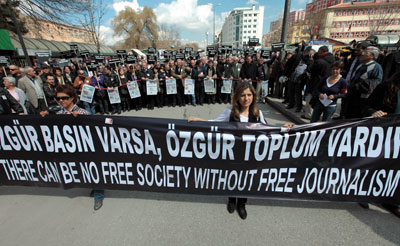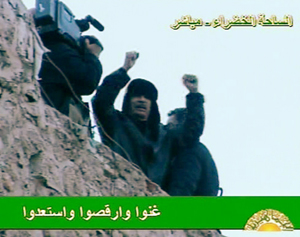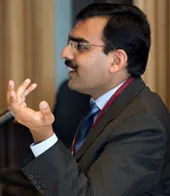Joel Simon/CPJ Executive Director
Joel Simon was the executive director of the Committee to Protect Journalists from 2006 to 2021. His writing on media issues has appeared in The New York Times, The Washington Post, The Guardian. and The Wall Street Journal, and he is a regular columnist for Columbia Journalism Review. Under his leadership, CPJ was honored with the Thomas J. Dodd Prize in International Justice and Human Rights, a News & Documentary Emmy, and the 2018 Chatham House Prize. His book, The New Censorship: Inside the Global Battle for Media Freedom, was published in November 2014, while We Want to Negotiate: The Secret World of Kidnapping, Hostages, and Ransom was published in 2018. Follow him on Twitter @Joelcpj.
Risk and reporting
Last night at London’s Frontline Club, CPJ launched its global survey of press freedom conditions, Attacks on the Press. The topic of discussion was the safety of journalists covering conflict and the panel consisted of journalist and documentarian Jenny Kleeman, ITN safety guru Colin Pereira, and journalist and filmmaker Maziar Bahari, who was imprisoned in…

Responding to Turkey’s appalling press freedom record
Prime Minister Recep Tayyip Erdoğan would like to take credit for Turkey’s economic growth and increasing regional influence, but when challenged on his country’s abysmal press freedom record he tends to blame others, including the media itself which, he says, exaggerates the problem. But the facts speak for themselves, as I noted in a letter…
Journalists killed: Inside the numbers
CPJ today released its annual tally of the journalists killed around the world. This is always a somber occasion for us as we chronicle the grim toll, remember friends who have been lost, and recommit ourselves to justice. It’s also a time when we are asked questions about our research and why our numbers are…
Obiang prize goes down to the wire
Teodoro Obiang Nguema Mbasogo is a stubborn man. In 2008, the president of Equatorial Guinea made a $3 million donation to UNESCO to underwrite a prize in the life sciences. But a groundswell of opposition from human rights groups, press freedom organizations, and governments appalled by Obiang’s record of kleptocracy and human rights abuses helped…
In Ethiopia case, a response to WikiLeaks
Last week, we learned that Ethiopian journalist Argaw Ashine was facing possible arrest and needed to flee the country. During a 10-day period in September, he had been summoned three times by Ethiopian authorities and questioned about a reference to him in a cable sent by the U.S. Embassy in October 2009 and made public…
NATO responds to CPJ, but questions remain unanswered
On August 4, CPJ wrote to NATO Secretary General Anders Fogh Rasmussen requesting information about the July 30 attacks on broadcast facilities in Libya in which NATO aircraft destroyed three broadcast dishes. As we noted in our letter, CPJ is concerned any time a media outlet faces a military attack. Such attacks can only be…

Request to NATO for clarification on Libya TV attack
On July 30, NATO warplanes attacked three transmission towers in Libya. The goal apparently was to knock Libyan state television off the air because, NATO alleged, “it was being used as an integral component of the regime apparatus designed to systematically oppress and threaten civilians and to incite attacks against them.”

Mission Journal: CPJ tackles impunity in Pakistan
After months of planning and preparation, our CPJ team had assembled in Islamabad with an ambitious plan. On May 3, we had a meeting scheduled with President Asif Ali Zardari to discuss the country’s failure to investigate the killings of journalists. We also had positive indications that our delegation would be able to meet with…